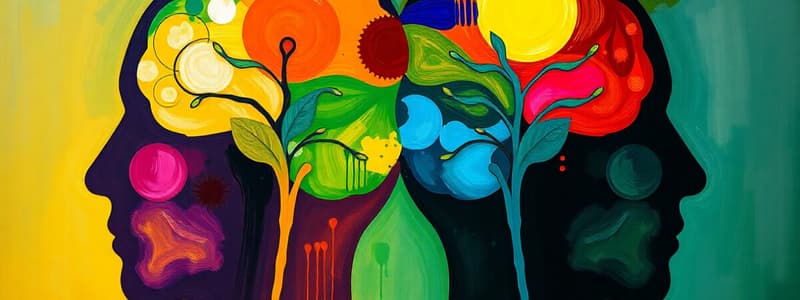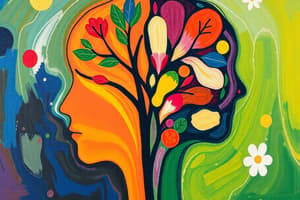Podcast
Questions and Answers
What does 'nature' refer to in the nature vs nurture debate?
What does 'nature' refer to in the nature vs nurture debate?
- An individual's genetic makeup (correct)
- Social interactions throughout life
- An individual's personal experiences
- Environmental influences during childhood
Which of the following is an example of a nurture influence?
Which of the following is an example of a nurture influence?
- Nutrition during childhood (correct)
- Inherited personality traits
- Physical characteristics determined by chromosomes
- Genetic predisposition to height
How many pairs of chromosomes are formed after the fertilization process?
How many pairs of chromosomes are formed after the fertilization process?
- 46
- 24
- 22
- 23 (correct)
What is the classification of personality types proposed by Aristotle based on physique?
What is the classification of personality types proposed by Aristotle based on physique?
Which statement correctly reflects the nature vs nurture debate?
Which statement correctly reflects the nature vs nurture debate?
Which type of factors are primarily associated with nurture?
Which type of factors are primarily associated with nurture?
How do genetic factors affect personality characteristics?
How do genetic factors affect personality characteristics?
What could be a consequence of poor nutrition during childhood on physical growth?
What could be a consequence of poor nutrition during childhood on physical growth?
What age range corresponds to the childhood stage characterized by the industry versus inferiority psychosocial issue?
What age range corresponds to the childhood stage characterized by the industry versus inferiority psychosocial issue?
Which virtue is associated with the psychosocial issue of trust versus mistrust?
Which virtue is associated with the psychosocial issue of trust versus mistrust?
At what stage do children begin to establish sexual interest according to the content?
At what stage do children begin to establish sexual interest according to the content?
What central question is posed during the early childhood stage associated with autonomy versus doubt and shame?
What central question is posed during the early childhood stage associated with autonomy versus doubt and shame?
Erikson was influenced by which other prominent psychologist?
Erikson was influenced by which other prominent psychologist?
In Erikson's theory, what is the psychosocial issue associated with the age range of 4-6 years?
In Erikson's theory, what is the psychosocial issue associated with the age range of 4-6 years?
What virtue is developed during the industry vs inferiority stage?
What virtue is developed during the industry vs inferiority stage?
Which stage of Erikson's development extends beyond the age of 18?
Which stage of Erikson's development extends beyond the age of 18?
What does the term 'heredity' refer to in personality development?
What does the term 'heredity' refer to in personality development?
Which of the following best describes the role of 'environment' in personality development?
Which of the following best describes the role of 'environment' in personality development?
How do 'situations' impact personality development?
How do 'situations' impact personality development?
Which statement accurately reflects the nature versus nurture debate in personality development?
Which statement accurately reflects the nature versus nurture debate in personality development?
What is a key takeaway regarding the development of personality?
What is a key takeaway regarding the development of personality?
Which aspect of culture does NOT contribute to personality development?
Which aspect of culture does NOT contribute to personality development?
Which of the following elements is NOT considered an aspect of the environment affecting personality?
Which of the following elements is NOT considered an aspect of the environment affecting personality?
How might engaging with the arts and intellects exemplify a community's culture?
How might engaging with the arts and intellects exemplify a community's culture?
What is a suggested strategy for preparing before class?
What is a suggested strategy for preparing before class?
How can students effectively handle doubts during their learning process?
How can students effectively handle doubts during their learning process?
What should students do to establish and leverage their learning style?
What should students do to establish and leverage their learning style?
Why is completing assignments considered important?
Why is completing assignments considered important?
What can be beneficial when creating a study environment?
What can be beneficial when creating a study environment?
What role does developing a study schedule play in learning?
What role does developing a study schedule play in learning?
What is advised for handling complex subjects during study sessions?
What is advised for handling complex subjects during study sessions?
How can note-taking benefit a student in class?
How can note-taking benefit a student in class?
Which subject areas are naturalistic intelligence individuals typically interested in?
Which subject areas are naturalistic intelligence individuals typically interested in?
In which of the following activities would a person with strong naturalistic intelligence likely feel most engaged?
In which of the following activities would a person with strong naturalistic intelligence likely feel most engaged?
What is a common misconception about individuals with naturalistic intelligence?
What is a common misconception about individuals with naturalistic intelligence?
Which of the following career paths is most suited for someone with naturalistic intelligence?
Which of the following career paths is most suited for someone with naturalistic intelligence?
Which of the following best describes a skill associated with naturalistic intelligence?
Which of the following best describes a skill associated with naturalistic intelligence?
What is a potential limitation for individuals with strong naturalistic intelligence?
What is a potential limitation for individuals with strong naturalistic intelligence?
How can naturalistic intelligence contribute to understanding ecological systems?
How can naturalistic intelligence contribute to understanding ecological systems?
Which intelligence category does NOT overlap significantly with naturalistic intelligence?
Which intelligence category does NOT overlap significantly with naturalistic intelligence?
What skill would NOT typically be attributed to individuals with naturalistic intelligence?
What skill would NOT typically be attributed to individuals with naturalistic intelligence?
Which characteristic is least likely attributed to naturalistic intelligence?
Which characteristic is least likely attributed to naturalistic intelligence?
Flashcards are hidden until you start studying
Study Notes
Nature vs Nurture
- Nature refers to innate qualities determined by genetics; traits remain consistent regardless of environment.
- Nurture involves personal experiences and upbringing that influence development, such as childhood nutrition and schooling.
- Both nature and nurture play crucial roles in shaping personality and physical traits.
Factors Affecting Personality Development
- Genetic factors include chromosomes and genes, which determine physical and personality attributes.
- Three body types categorized by Aristotle:
- Endomorph: Short and stocky
- Ectomorph: Tall and thin
- Mesomorph: Muscular and well-proportioned
- Environmental factors encompass social influences from family, school, and culture.
Theories of Personality Development
- Personality development is influenced by heredity, environment, and personal experiences.
- Heredity includes innate traits and temperament, difficult to alter.
- Environment covers home, school, and social contexts, affecting growth.
- Situations include life experiences (e.g., trauma, joyful events) that imprint personality.
Childhood Development Stages
- Childhood is critical for personality foundation, emphasizing peer relationships and hobbies.
- Development stages noted in Erik Erikson's theory span from infancy through adulthood, focusing on psychosocial issues.
Erik Erikson's Stages of Development
- Infancy (0-1): Trust vs. Mistrust; builds sense of security and hope.
- Early Childhood (2-3): Autonomy vs. Shame; fosters independence and will.
- Childhood (4-6): Initiative vs. Guilt; encourages initiative and purpose.
- Childhood (7-12): Industry vs. Inferiority; promotes competence and confidence in skills.
Intelligence Types and Skills
- Verbal-Linguistic: Involves listening, speaking; careers include writers and teachers.
- Mathematical-Logical: Emphasizes problem-solving; fields include scientists and accountants.
- Musical: Relates to rhythm and composition; careers for musicians and composers.
- Visual-Spatial: Focus on design and visualization; occupations for architects and artists.
- Bodily-Kinesthetic: Relates to physical movement; careers include athletes and dancers.
- Interpersonal: Understanding others; professions in counseling and sales.
- Intrapersonal: Self-awareness; suitable for researchers and philosophers.
- Naturalistic: Understanding nature; careers as biologists or conservationists.
- Existential: Deep questioning of existence; roles in theology and philosophy.
Effective Learning Skills and Styles
- Prioritize preparation for classes by arriving early and being organized.
- Keep notes during lectures for retention and review.
- Identify and adapt to personal learning styles for optimal comprehension.
- Address doubts promptly to avoid confusion and enhance understanding.
- Complete assignments thoroughly to reinforce knowledge and learning success.
- Create a dedicated study environment for focus and resource accessibility.
- Develop a study schedule to outline time and priorities.
- Begin studying complex subjects first to build momentum.
Studying That Suits You
Use AI to generate personalized quizzes and flashcards to suit your learning preferences.




